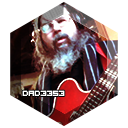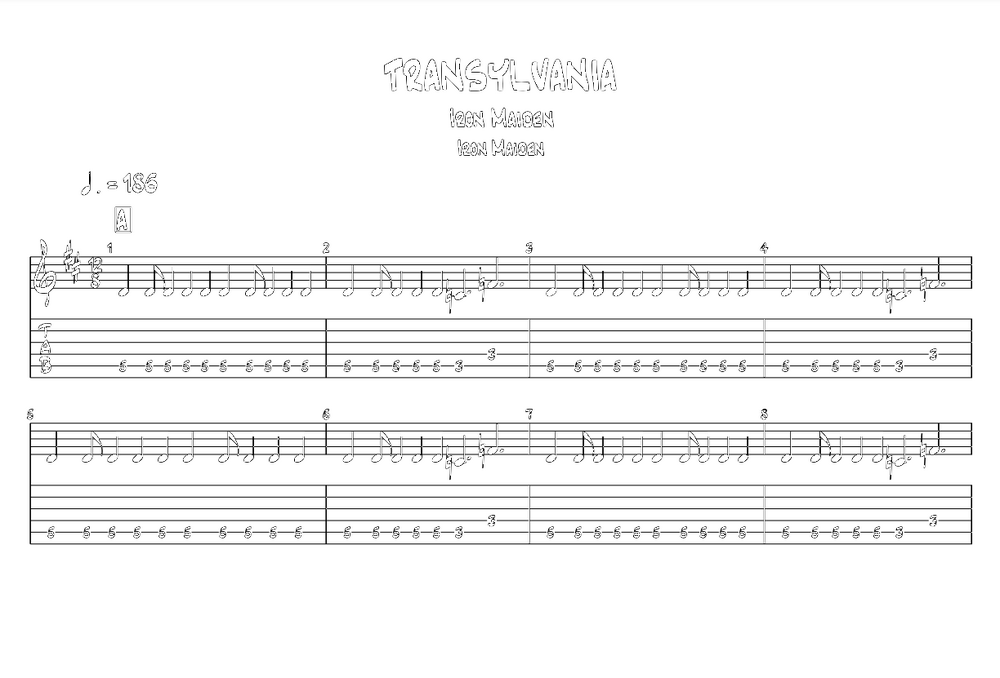-
Posts
1,258 -
Joined
-
Last visited
-
Days Won
232
Content Type
Profiles
Forums
Events
Shop
Everything posted by Dad3353
-
Good evening, Stephen, and ... ... Plenty to read and amuse you here, and lots to learn and share.
-
Does this help..? Note the 12/8 time signature, think Scottish jigs and reels when listening to it (Diddly, diddly, diddly, diddly...) Count, slowly, in groups of three (triplets...), such as 1-3,223,3-3,423, 1-3 223,3--,4-- where the dashes represent a note not played. Allow me to recommend Guitar Pro; it's very good.
-
Good evening, @Merkin2024, and ... ... Plenty to read and amuse you here, and lots to learn and share.
-
It's a non-issue. Off with the old, have a quick clean-up whilst the strings are off (toothbrush and lint-free cloth around the bridge, tuning pegs, frets...) and on with the new. Tune up to pitch and play on. The neck will be fine.
-
... and here's a link to the ad ... Taylor - Big Baby Taylor acoustic/electric guitar ...
-
See here, an old Reverb listing from ten years ago ... Reverb sale (long ended...) Kay KeyKord ... A novelty instrument of its day. Hope this helps.
-
I'm not sure that I understand the question. I'm a drummer; I don't count 'notes', I count the tempo. If I need to play something fast, when I'm learning it, I play it slowly. Once I've mastered it slowly, I'll increase the tempo, little by little (over a couple of weeks, for instance...) until I can play it at, or slightly faster, than the target tempo. By that time, there's no 'counting' involved, as it's ingrained. The secret to playing anything fast is to play it slowly. Does this help..?
-
I agree with EZ, above ^^; it sounds like a guitar being played rapidly with a pick. Just about the opposite of how I play (badly, slowly, with fingers...), so the sound I get, myself, is very different. I don't think I can help much, if at all, but I don't think you really have a problem, either. Play with whatever sounds you're getting, rather than analysing what's going on. In other words, if you have lemons, make lemonade.
-
Don't trust me on this as I have cloth ears. I hear no 'whistling', nor harmonics, on that last (third...) recording. You say it's without gain; it sounds distorted to me, not at all like a guitar simply plugged into an amp. Are you using pedals at all with all of this..? Can you record just the guitar, with no Fx at all (downstrokes is fine, or just play a tune...)..?
-
A quick search for 'luthier tone wood supplier uk' brings up several suppliers. We're in France, so the suppliers in Portugal or Spain are our main source, but that won't interest you in the UK, I suppose. Still, half a dozen came up, to get you started. What use do you have..? Guitar/bass..? Classical, folk, electric, other..? Just askin'; hope this helps.
-
I'm not sure that there are any guitars that are excluded from playing 'metal', but if I take that to mean roughly Strat-shape, with a pointy headstock, I'd start by looking at the Thomann B-stock offers. 'B-stock' means that someone ordered one, then sent it back, normally, but they are perfectly sound, and carry the same guarantee as others. It's a way of getting a bit off the price. Here's a link to some I'd suggest fall into your criteria (between £200-£300...)... Thomann 'Bargain' ST-type guitars, with no vibrato, UK prices ... Feel free to play around with the filters on the left, to see what else is on offer. There's nothing wrong with Tele-style, Les Paul-style, SG-style etc guitars either for metal (maybe avoid archtop though, as a beginner...). All of these guitars hold their tuning, and can be used in any style, including metal, of course. There are many other suppliers than Thomann, but this is an easy way to see and compare what's on the market, from the comfort of one's own home. Nothing beats trying out various instruments at a music shop, once one has an initial idea of what to try out. My personal choice would be a Squire Affinity Tele Deluxe (I prefer humbuckers...), like this one ... Thomann Squire Affinity Deluxe ... ... or this one ... Thomann Harley Benton Fusion T-HH ... Spoilt for choice, now, eh..?
-
Good afternoon, Andico... Unless it's going to be a feature of your playing, I don't think I'd advise any guitar in this price range with a vibrato ('whammy bar'...). The good guitars get away with it, once up in the 'pro' league, and with a tame technician to match, but, in my opinion, they're an unnecessary source of trouble, especially when learning, in almost any style. If you really need it, go ahead, but I'd advise looking at other models without this accessory that have the features you want. No guitar in this range will have an inherent 'staying in tune' problem, whatever the make; Ibanez have an excellent reputation, but so have many others. Your call, naturally, but holding its tune should never be an issue, especially for one's first guitar. Disclaimer : I've never had a use for a vibrato of any kind, as 'dive-bombing' is not an effect I affection in my playing. If I had to have that effect, I'd do as our son, Our Eldest, does, and use a detune pedal (think the dying notes of 'Karma Police'...). Hope this helps.
-
Good afternoon, @suzukisan, and ... ... Plenty to read and amuse you here, and lots to learn and share.
-
'Misty'. Still learning it, over half a century later, and still striving to overcome its difficulties, exacerbated by increasing memory issues.
-
Mickey Baker, with his 'Complete Course in Jazz Guitar'. First bought back in the mid '60s, I've worn it out and bought it again several times, and still use it today. It costs less than peanuts from a well-known purveyor of books and other sundries, and will serve for a lifetime. What did it teach me..? That there are many ways to skin a cat, and persistence pays dividends when going through the exercises. Eternal thanks to The Master.
-
If you'll be needing an electro-acoustic, it'll be the Martin, as the Taylor has no built-in mic. Otherwise, they are very similar for their price point, so reputation, aesthetic and personal feeling would be he only factors, really. Can you not try each..? None in stock at your nearest guitar outlet..? The Taylor is currently in stock from Thomann; the Martin needs a couple of weeks at least before delivery. Maybe just as important would be the choice of hard case, or solid gig bag, for toting either around, depending on what transport you'll be using.
-
Can you take a close-up photo of the tuners, and the method of attaching them..? There are several different ways; a good photo would help to give appropriate advice. Over to you..?
-
My usual words of encouragement for this 'harder on the fingers' issue... 'It's the first forty years that are the worst, after which things sometimes have a tendency to get slightly better.' ...
-
What..? Dylan, electric..? Heresy..! ...
-
I agree ^^.
-
This ^^. More information needed as to your goal in order to give pertinent advice. Over to you...
-
They will be amply quick enough if you play at a much slower tempo (about half-speed..?). Preferably with a metronome, and slowly (very slowly...) increase the tempo by a small notch every week or so. That way it'll come up to speed all on its own. The fastest way to play fast is to play slowly, trust me. It sounds as if you're doing well (or, indeed, very well..!). Hope this helps. Douglas
-
Each fret is a half-tone higher, so, for the 'E' string... E, F, F#, G, G#, A, A#, B, C, C#, D, D#, E octave.
-
I'd suggest that any reasonably-popular guitar, made by any reasonably-popular maker, from any reasonably-popular supplier will be fine for any beginner. There can always be a flaw in any manufactured item; guitars are no exception, but they are rare. If any guitar purchased could be vetted (played by...) a decently competent guitar-playing buddy, to check that it's all working (and it will be...), there's little chance of anything seriously wrong happening. What some reviewers might describe as 'absolutely terrible' could be really insignificant details, that don't affect playing, and wouldn't be noticed by most folk. Any described as 'absolutely fantastic' could, by the same token, have been written by someone paid to give a glowing review. Ideally, you should try out any instrument yourself, or with a competent chum, in a reputable store, and decide what's good for you and your budget. If you must order through the web, there is ample protection against bitter disappointment, and, of course, the normal legal guarantees for any faults. In short, trust yourself more, and go for whatever you like the look of, that will inspire you to learn and play, and is in your budget, from any reputable source, the closer to you the better. If we all gave a list of what's 'great' and what's 'rubbish', you'll not be more advanced. It's all good, as long as it inspires you to learn and play it. Hope this helps. Douglas







